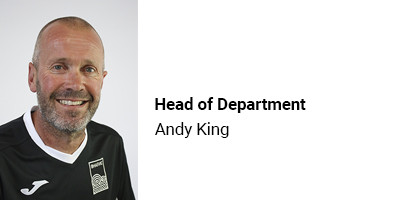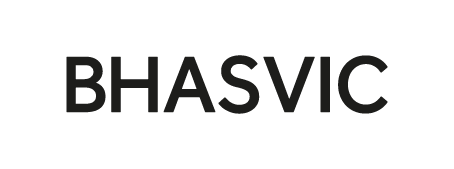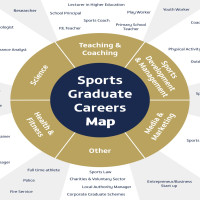Sport and Exercise Science BTECs
Qualification: Sport and Exercise Science Extended Certificate (single course) or Diploma (double course) BTEC Level 3
Exam Board & Specification Code: Pearson; Specifications: Single, Double
Course Entry Requirements: 4 in Maths GCSE and 4 in English Language GCSE or 4 in English Literature GCSE. Also, 4 in Science GCSE preferred. It is not possible to study more than 1 P.E. or Sport / Sports Science course, other than with Fitness level 3.
Please make sure that you have understood the overall entry requirements to study at BHASVIC. These are available here and outline the GCSE grades you need to take up one of the Study Programmes at the college.
Length and size of qualification: 2 year single or double courses, equivalent to 1 or 2 A levels
Timetable hours: 4.5 or 9 hours per week
Assessment method: A mixture of exams, controlled assessments and coursework
BHASVIC Department: Sport, Health & Exercise Science
Read our guide to BTECs at BHASVIC
What will I study?
The sports industry is broad and includes both scientific and more applied, practical sectors. To represent this, you will study a range of units with academic and vocational application. of understanding and knowledge in diverse topics such as sport psychology, biomechanics, physiology, coaching and fitness. Where possible, learning embraces community connections with vocational trips or specialist guest speakers and research in university laboratories. You will acquire academic research methods, data analysis and ICT skills. You will also other essential life skills, such as leadership, resilience, communication and collaboration, which underpin all progression routes whether in sport or not.
Is this course right for me?
These are academically demanding and applied courses suiting analytical students where a strong science understanding is advantageous. You should be a committed and independent learner with the personal management skills to meet independent study and coursework deadlines. Learning and assessment is varied to represent workplace and university style demands, with some external examination and coursework assessment. Units 1, 2, & 3 (depending on the course taken) are externally assessed by an exam. All other units are assessed by coursework which may include written reports, academic posters, practical coaching, video or live presentations. Because the course is modular, you will study one unit at a time and when it is complete, you focus solely on the next. This allows you to intensely focus your attention and maximise your grades each unit. You will receive excellent staff guidance to enable you to achieve excellent results, while enriching your study skills and personal development. With the right attitude and effort, students gain above national average course results.
Where next?
Sport and Exercise Science lends itself to a range of career progression routes that may continue in the field of sport, but also non-sport careers. Our courses are credible and gain UCAS points that will enable you to pursue a sport or non-related degree. Some students go directly into the workplace and others choose to follow an apprenticeship where they study and learn in-job skills. Some sport-related progressions are a nutritionist, sport therapy, physiotherapy, teaching, personal trainer and chiropractic. Useful sites include Careers in Sport, Prospects, BASES, All About Careers and The Apprenticeship Guide. Sport Science is the ninth most popular university route from BHASVIC, providing credible progression to both university degrees and the workplace.
Last year 57 BHASVIC students went onto study Sport and Sport & Exercise Science at universities including Durham, Leeds Beckett, Liverpool John Moores, Loughborough, Manchester Met, Northumbria, Nottingham, Oxford Brookes, Solent, St Mary's University, Twickenham, UCFB, Bath, Brighton, Chester, Chichester, UEA, Exeter, Kent, Leeds, Nottingham, Portsmouth, Salford, Surrey, Worcester.
Many of our students go onto pursue a career in sport and will embark on many pathways, including higher education.
In addition to studying sport at university, student will begin professional sporting careers, take up coaching or sponsorships in the UK and abroad. Students can add Sport Performance to their timetable at BHASVIC for their chosen sports.
Should I study Physical Education and Sport at degree level?
You will develop your skills and knowledge in and around training and competition. Topics range from your own physical conditioning, sports coaching, performance psychology, performance analysis, sport development and sports nutrition. You will have around 12 hours of lectures each week and workshops too. Content will be diverse and will often involve participation in sporting activities outside lectures.
Types of Physical Education and Sport degree
Sport is a very wide-ranging subject area and combines well with:
- Coaching
- Performance
- Management
Even Sport Journalism, Law and Marketing.
Entry Requirements
A-level PE or BTEC Sport is very useful
Useful to have
- Related subjects such as Business depending on what are of the Sports industry you would like to focus on
Top Universities for Physical Education and Sport
Exeter, Loughborough Bath, Glasgow, Edinburgh, Durham
Leeds, Nottingham, Portsmouth, Essex – all very high student satisfaction scores
Birmingham, Swansea, Liverpool John Moores - all with top graduate prospects
Many of our students choose a combined degree - applications from our students have included:
- Football Studies
- Sports Management and Development
- Fitness and Personal Training
- International Football Business
- Sport Media
Example entry requirements:
A-Level/BTEC equivalents (please check):
Leeds Trinity Sports Psychology UCAS Points: 112-136
Derby Sport Management UCAS Points: 112-120
Sheffield Hallam Sport Coaching UCAS Points: 112-120
Why not try a foundation degree or higher apprenticeship?
Brighton Sport (Foundation) D,D,D
Some examples of Physical Education and Sport-related degrees that our BHASVIC students have gone onto study in the past few years are:
- Sport Coaching
- Sport Development and Physical Education
- Sport, Coaching and Physical Education
- Sport Management and Coaching with professional placement
- Sport Performance Analysis
- International Football Business
- Multimedia Sports Journalism
- Performance Analysis and Coaching Science
- Physical Education (Primary Years)
- Physical Education with QTS (Secondary)
- Sport Journalism
- Sport Management
- Sport Rehabilitation
- Sport, Physical Education and Coaching Science
- Sports Business and Entrepreneurship
- Sports Business Management (Foundation Year)
- Sports Business & Sports Law
- Sports Journalism
- Sports Marketing Management
- Sports Technology
How BHASVIC helps: We have a wide range of information and resources to support students applying for university including subject area guides, personal statement and UCAS resources, super-curricular activity guides, open day and bursary information. We also cover university research, careers, art foundation and all other destinations in depth in tutorial and students can choose an appropriate pathway for them in the second year from UCAS, Employability & Enterprise, Visual Arts, Oxbridge and Medics. Our Spring Futures Fair brings in a huge number of university visitors with workshops and information stands and departments will bring speakers in wherever possible.
The sport and leisure sector offer a range of career opportunities. Sports coaching offers a career in a range of settings, from professional sports clubs to primary schools and prisons.
- Coach
- Armed forces training and education officer
- Secondary school teacher
- Sport administrator
- Outdoor education manager
- Fitness Centre manager
- Personal Trainer
Career Prospects
This is a subject area with many pathways and studying Sport and Physical Education at A level / BTEC is likely to give lots of opportunities. The good news is the country's appetite for good health and fitness means that sports students are less likely than average to be out of work. Sports students, not surprisingly, tend to get jobs in sport and fitness, coaching and teaching especially, but they're found all over the economy. Management is also a popular option for students from this subject after all, this is a subject for people who want to motivate others! Some students go onto careers performing the sports in which they excel.
Albion in the Community
We are lucky enough to have a Premier league football club on our doorstep and Albion in the Community provide a wide range of opportunities for both employment and apprenticeships. They also work with a growing number of local organisations and businesses to recruit and support apprentices across a range of jobs; these include leisure, activity leadership, PE and school sport, business administration, customer service and management.
Examples of apprenticeships and opportunities include:
- Sports Coach Apprentice
- School Sports and Club Coach
- PE/Sports Technician
How BHASVIC helps: We have an excellent Careers Hub and careers advisors who are available for appointments through student services. Local jobs are advertised and they will advise on skills and specialist areas such as degree apprenticeships. Students can choose an appropriate pathway for them in the second year from UCAS, Employability & Enterprise, Visual Arts, Oxbridge and Medics. Our Spring Futures Fair brings in a huge number of careers & apprenticeship visitors with workshops and information stands and departments will bring speakers in around the subject area.
You will gain many transferable skills studying Physical Education and Sport that will be valued in the workplace including:
Research & analytical skills, critically evaluating information, designing research studies, data handling, problem solving, decision making, leadership, time management, communication
Local Skills
The Local Skills agenda considers job prospects and employment in our local area of Sussex. Many of our students will contribute to the National Skills agenda and go onto find a career in a wide range of sectors. For students in Sussex our local skills are identified as the following sectors:
- Construction
- Creative & Cultural
- Digital (includes IT and Technology)
- Engineering & Manufacturing
- Healthcare (includes Bio Life Sciences and Pharmaceutical)
- Visitor & Hospitality
- Land-based (includes Agriculture and Viticulture)
- Green Skills
Degree choices that match the Local Skills agenda our BHASVIC students went onto study include:
- Sports Business & Sports Law
- Sports Marketing Management
- Sport Development and Physical Education
- Sport, Coaching and Physical Education
- Sport Management and Coaching with professional placement
Career choices that match the Local Skills agenda our BHASVIC students went onto work in include:
- Sports Business
- Sports Law
- Sports Marketing Management
- Sport Coaching
- Teaching
How BHASVIC helps: Skills Week in A1 helps students build skills in the workplace and a focus on developing skills through tutorial in A1 and A2 supports students in writing outstanding Personal Statements and CVs. We know our students have already gained a wide variety of skills at home and with extra-curricular activities and will increasingly take up jobs. Our focus is on supporting them to evidence skills already gained, identify gaps and ensure that they transfer that to CVs and applications. This is in partnership with every curriculum area.

